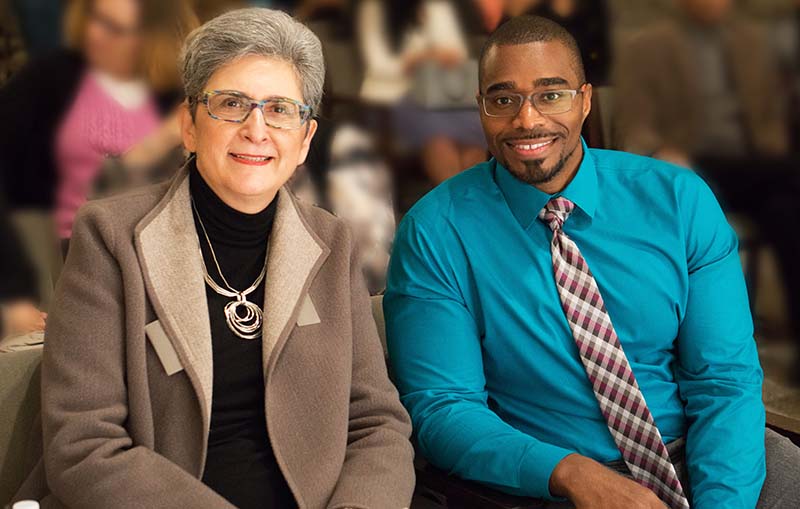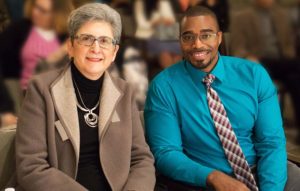



During the last year or so of renewed social unrest, countless initiatives across the country have sprung up to tackle issues of systemic racism. One unique initiative — the Baha’i Chair for World Peace at the University of Maryland (UMD) — already has a 28-year history of fighting for justice and continues to act passionately for race unity.
Baha’is know there can be no peace in a world rife with racism, says Hoda Mahmoudi, research professor and director of the Baha’i Chair program since 2012. To this end, the Chair uses an intensive learning process focused on five central themes:
Mahmoudi describes the vision that Baha’u’llah, Founder of the Baha’i Faith, offered in the mid-1800s. “Peace is a holistic concept; it’s all-inclusive,” she says. “The peoples and the nations of this planet that have to progress and advance to the level which Baha’u’llah envisions — this concept of the oneness of humankind — is not just a mere brotherhood. It’s really the total transformation and reconstruction of the world. That’s a big call and a huge vision.”
While protests filled streets across the country these last many months, the Chair steadfastly continued its work of presenting speakers, publishing work and educating through classes, including The Problem of Prejudice, which Mahmoudi teaches.
“’Abdu’l-Baha [Baha’u’llah’s son] said there’s not a single person in the world who doesn’t want peace. But to wish for it and to achieve it is vastly different,” says Mahmoudi. “What is different is conscience. He writes about what that requires — to eliminate all forms of prejudice.”
On June 1, 2020, the Chair issued a statement of solidarity, proclaiming: “The Baha’i Chair for World Peace is heartbroken about the tragic deaths of George Floyd, Breonna Taylor, Ahmaud Arbery and so many others. Our hearts go out to their families and loved ones — and to all those touched by the terrible effects of degradation and violence. Not enough can ever be said about the entrenched, ongoing scourge of racism and its toll on African-American lives. We stand in support of all those fighting for change. We are all responsible for eradicating racism.”

Rashawn Ray, a UMD sociology professor and executive director of the university’s Lab for Applied Social Science Research, has high praise for the Chair. “I think that Hoda is leading one of the most transformative initiatives to address not just racial inequality, but all important issues of our day: the environment, women’s rights and human rights,” he says. “This type of work is rare and difficult to do and Hoda pulls it off gracefully and makes it look easy, and I know it’s not.”
Ray and Mahmoudi met at a welcome reception when they were both new to the university. “Hoda was one of the only people who came over and started talking to me. We just sparked a conversation. That type of energy and consciousness is not just in Hoda; it’s in all Baha’is. It speaks to what the Baha’i Faith is all about,” Ray says. “If people want to make a difference, they can make a difference by supporting the Chair.”
All of the Chair activities have been meaningful, Ray says, because “they are part of a larger organizational plan for progress. One of the activities that resonates with me, because of everything going on with policing, was when Hoda brought two of the leading experts on gun violence to speak,” he says. “It was literally the deepest conversation I’ve ever had about why gun violence exists. It was a process-driven conversation,” he says.
Among other undertakings, Mahmoudi delivered a powerful reflection on behalf of the Chair at a virtual town hall panel on Policing and Racism in America, sponsored by the university’s College of Behavioral and Social Sciences.
The Chair is also participating in the university’s Anti-Black Racism Initiative, designed to further coordinate, publicize and enhance efforts to identify, disrupt and prevent anti-Black racism. The Chair also takes part in the Reparations Series Committee, established to plan events exploring history, psychology, policy, economics, and more associated with American slavery, racial injustice and structural inequality. Mahmoudi serves with Ray as faculty member on these committees.
In September, the Baha’i Chair co-sponsored an event on reparations with the Anti-Black Racism Initiative. The event panel included numerous distinguished speakers, such as U.S. Rep. Barbara Lee, and was moderated by Ray, who says that when it comes to social justice issues, “Hoda is viewed as one of the key people who can speak on these issues and address them.”
The Baha’i Chair is also known for its published works. “Over the years I’ve been nothing but impressed by Hoda’s ability to attract the top scholars around the world to participate in events and in written text,” says Ray. “She’s been able to put together a program and a system where people come in and they speak, but they also write. These types of endeavors deserve and need more resources to continue to do what they do. The Chair has been doing this work for years so it’s not surprising that the Baha’i Chair is on the front line.”
The Chair is well known for thought-provoking and inspiring presentations normally held at the university, and the pandemic has moved nearly all its 2020 presentations to online venues, reaching a global audience. Here are highlights:
Historically, Ray says, the University of Maryland has had a strained relationship with Prince George’s County, where it is located, where the country’s most affluent predominantly Black population lives. Mahmoudi has made progress on bridging the gap, partly “because of the reputation she’s built up,” he says. Key community members have been included in Chair programs in recent years.
Mahmoudi has also been able to showcase the Baha’i Faith, says Ray, who is not a member. “A lot of people didn’t know about the Faith, but because of her, they know what the Faith stands for; they have an understanding and respect of it.”
Videos of the Baha’i Chair’s lectures and symposia on the theme of Structural Racism and the Root Causes of Prejudice can be found here.


![]()
![]()
Whether you are exploring the Bahá'í Faith or looking to become an active member, there are various ways you can connect with our community.
Please ensure that all the Required Fields* are completed before submitting.